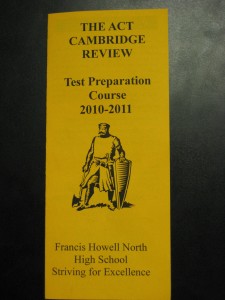 The first time taking the ACT is not very fun is it? When you don’t know anything about the test or what is going to be on it, when you don’t finish all your questions on time, when you find questions that you never heard of before or wont learn until you’re a senior, and of course facing the panic attacks. All these conflicts are typical when you take your first ACT. Here are tips to help you succeed.
The first time taking the ACT is not very fun is it? When you don’t know anything about the test or what is going to be on it, when you don’t finish all your questions on time, when you find questions that you never heard of before or wont learn until you’re a senior, and of course facing the panic attacks. All these conflicts are typical when you take your first ACT. Here are tips to help you succeed.
You can find ACT tips all over the place like your school, online, and the library. For instance the Cambridge review is a great place for practice, to get a better score, and have more experience on what will be on the test. You may think that it is a waste of time, but many students who took or are taking them have been improving enormously.
“ I had know idea what the ACT was like and this taught me how to think and know what will be on the ACT,” Andri Krager said.
You can go to www.actstudents.org. This website can give you tons of information about the test and other things. Lastly getting an ACT practice book. It will carry practice tests, questions with answers that will be on the test, and will teach you strategies.
There are a couple strategies that you should take advantage and are quite simple like physical tips. For instance, exercise, getting a good night sleep, and a nutritious breakfast, not junk food.
A common mistake is not reading a question carefully. On the ACT, pay close attention to the question because sometimes they can mean another thing and pay close attention to certain words such as not or least. Especially when they are underlined, capitalized, and bolded. Another is qualifying words that you need to be careful with like most, some, none, always, usually, seldom, sometimes, never, best, worst, highest, and lowest. Lastly, read all the answers because one could be better than another.
When answering questions, eliminate the answers you know are wrong and if you are still not sure, guess. If you know nothing about a question then guess C. Go through the easy questions first and guess on the hard ones while marking on the hard ones, so if you have time you can go back and answer the hard questions.
Pace yourself; for example, don’t focus on one question for ten minutes. Also, you can practice your timing by taking practice ACT’s.
With the reading part of the ACT Mrs. Grimshaw, an AP English teacher, said, “ I read my subject area that I was the strongest in, and did my hardest last because I know I would get most of them wrong anyway”.
Hope this will help out with taking the ACT.
By Kaitlyn McCann









